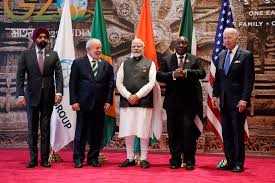
Prime Minister Narendra Modi’s attendance at the G20 Leaders’ Summit in Johannesburg carries profound significance, not only for India’s global standing but also for the larger narrative of emerging economies asserting themselves on the world stage. This year’s summit, the first ever held in Africa, provides a timely platform to address pressing global challenges through the lens of inclusivity, sustainability, and solidarity, under the summit’s theme of “Solidarity, Equality and Sustainability.” India’s role at the G20 has grown steadily in recent years, particularly under its 2023 presidency, which emphasized multilateral cooperation, equitable growth, and climate action. Modi’s presence in Johannesburg reaffirms India’s position as a key actor capable of bridging the priorities of developed and developing nations. The summit serves as an opportunity to present India’s perspectives on economic recovery, energy transition, digital innovation, and global security in a manner that reflects both national interests and the broader aspirations of the Global South. Bilateral engagements, such as Modi’s meeting with Australian Prime Minister Anthony Albanese, highlight India’s commitment to deepening strategic partnerships. These discussions reinforce ties across trade, defence, education, science and technology, and people-to-people links, showcasing India’s comprehensive approach to diplomacy. Such interactions are crucial in a world increasingly defined by geopolitical uncertainties and economic interdependencies. Equally significant is Modi’s engagement with the Indian diaspora in South Africa. The diaspora acts as a cultural and economic bridge between India and the world, and Modi’s participation in cultural events, such as witnessing performances of traditional songs like Ganga Maiya, reinforces the importance of India’s soft power. This blend of cultural diplomacy with high-level political negotiations reflects Modi’s holistic approach, where India’s heritage and values are integrated into global discourse. The G20 summit also provides India an opportunity to reinforce its vision of Vasudhaiva Kutumbakam—the idea that all nations are part of a single global family. In a world grappling with climate change, economic disparities, and geopolitical tensions, India’s principled stand on cooperation, equity, and sustainability offers a constructive and moral compass for global governance. In sum, Modi’s participation in the G20 Leaders’ Summit is a reaffirmation of India’s growing influence in global affairs. It demonstrates that India is not just a participant in international forums but a proactive contributor, offering solutions, building partnerships, and promoting values that reflect both its national ethos and its responsibility as a global leader. The summit is an opportunity for India to shape dialogue, foster collaboration, and reinforce the narrative of a rising India committed to progress, peace, and shared prosperity.
Prime Minister Narendra Modi’s attendance at the G20 Leaders’ Summit in Johannesburg carries profound significance, not only for India’s global standing but also for the larger narrative of emerging economies asserting themselves on the world stage. This year’s summit, the first ever held in Africa, provides a timely platform to address pressing global challenges through the lens of inclusivity, sustainability, and solidarity, under the summit’s theme of “Solidarity, Equality and Sustainability.” India’s role at the G20 has grown steadily in recent years, particularly under its 2023 presidency, which emphasized multilateral cooperation, equitable growth, and climate action. Modi’s presence in Johannesburg reaffirms India’s position as a key actor capable of bridging the priorities of developed and developing nations. The summit serves as an opportunity to present India’s perspectives on economic recovery, energy transition, digital innovation, and global security in a manner that reflects both national interests and the broader aspirations of the Global South. Bilateral engagements, such as Modi’s meeting with Australian Prime Minister Anthony Albanese, highlight India’s commitment to deepening strategic partnerships. These discussions reinforce ties across trade, defence, education, science and technology, and people-to-people links, showcasing India’s comprehensive approach to diplomacy. Such interactions are crucial in a world increasingly defined by geopolitical uncertainties and economic interdependencies. Equally significant is Modi’s engagement with the Indian diaspora in South Africa. The diaspora acts as a cultural and economic bridge between India and the world, and Modi’s participation in cultural events, such as witnessing performances of traditional songs like Ganga Maiya, reinforces the importance of India’s soft power. This blend of cultural diplomacy with high-level political negotiations reflects Modi’s holistic approach, where India’s heritage and values are integrated into global discourse. The G20 summit also provides India an opportunity to reinforce its vision of Vasudhaiva Kutumbakam—the idea that all nations are part of a single global family. In a world grappling with climate change, economic disparities, and geopolitical tensions, India’s principled stand on cooperation, equity, and sustainability offers a constructive and moral compass for global governance. In sum, Modi’s participation in the G20 Leaders’ Summit is a reaffirmation of India’s growing influence in global affairs. It demonstrates that India is not just a participant in international forums but a proactive contributor, offering solutions, building partnerships, and promoting values that reflect both its national ethos and its responsibility as a global leader. The summit is an opportunity for India to shape dialogue, foster collaboration, and reinforce the narrative of a rising India committed to progress, peace, and shared prosperity.
© Copyright 2023 brighterkashmir.com All Rights Reserved. Quantum Technologies